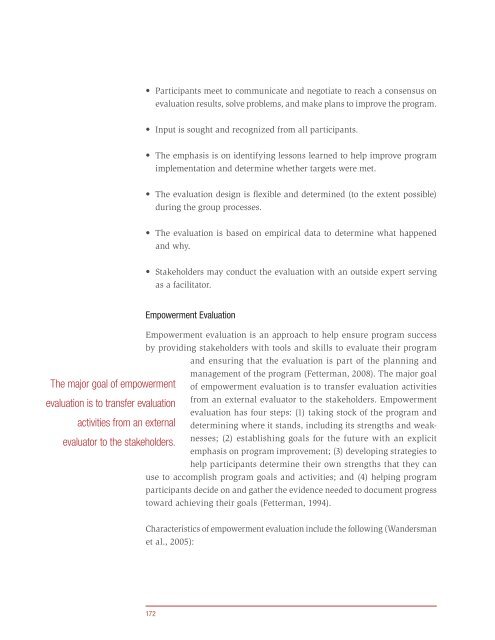Principles of Community Engagement (Second Edition)
Principles of Community Engagement (Second Edition)
Principles of Community Engagement (Second Edition)
Create successful ePaper yourself
Turn your PDF publications into a flip-book with our unique Google optimized e-Paper software.
The major goal <strong>of</strong> empowerment<br />
evaluation is to transfer evaluation<br />
activities from an external<br />
evaluator to the stakeholders.<br />
• Participants meet to communicate and negotiate to reach a consensus on<br />
172<br />
evaluation results, solve problems, and make plans to improve the program<br />
• Input is sought and recognized from all participants.<br />
• The emphasis is on identifying lessons learned to help improve program<br />
implementation and determine whether targets were met<br />
• The evaluation design is flexible and determined (to the extent possible)<br />
during the group processes<br />
• The evaluation is based on empirical data to determine what happened<br />
and why<br />
• Stakeholders may conduct the evaluation with an outside expert serving<br />
as a facilitator<br />
Empowerment Evaluation<br />
Empowerment evaluation is an approach to help ensure program success<br />
by providing stakeholders with tools and skills to evaluate their program<br />
and ensuring that the evaluation is part <strong>of</strong> the planning and<br />
management <strong>of</strong> the program (Fetterman, 2008) The major goal<br />
<strong>of</strong> empowerment evaluation is to transfer evaluation activities<br />
from an external evaluator to the stakeholders Empowerment<br />
evaluation has four steps: (1) taking stock <strong>of</strong> the program and<br />
determining where it stands, including its strengths and weaknesses;<br />
(2) establishing goals for the future with an explicit<br />
emphasis on program improvement; (3) developing strategies to<br />
help participants determine their own strengths that they can<br />
use to accomplish program goals and activities; and (4) helping program<br />
participants decide on and gather the evidence needed to document progress<br />
toward achieving their goals (Fetterman, 1994)<br />
Characteristics <strong>of</strong> empowerment evaluation include the following (Wandersman<br />
et al , 2005):

















